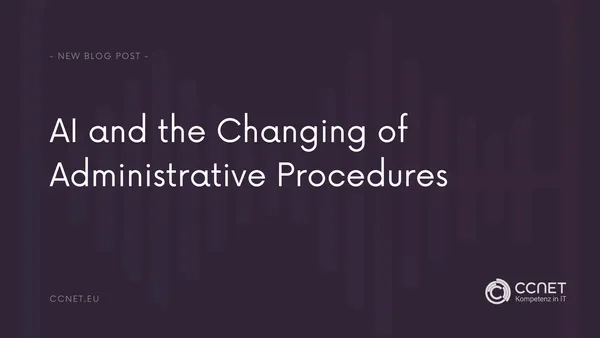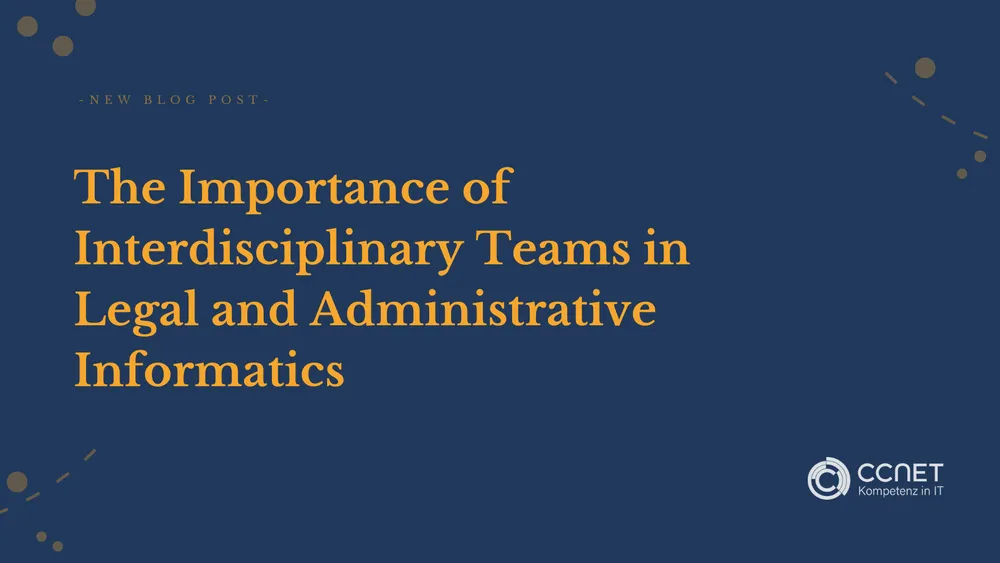
CCNet
Aug 2, 2024 • 3 min read

AI and the Transformation of Administrative Procedures: Efficiency, Transparency, and Challenges
The integration of artificial intelligence (AI) into administrative procedures represents a significant step in the digitalization of public services. AI systems offer the potential to automate processes, support decision-making, and make services more efficient. Despite their promising technological advances, they also raise complex legal and ethical questions that must be carefully addressed to appropriately evaluate the opportunities and risks and make responsible decisions.
Further information can be found here: AI-Consulting
Applications of AI in Administration
AI systems are used in various aspects of administrative action, from automating simple tasks to supporting decision-making in more complex processes. Rule-based AI systems, which follow clear "if-then" rules, provide high transparency and traceability of decision paths. They are particularly suitable for standardized administrative acts, such as issuing documents or handling standard inquiries. These characteristics ensure efficient and reliable administrative processing.
Benefits of AI in Administrative Procedures
The benefits of AI in administrative procedures are manifold:
- Increased Efficiency: AI can reduce application processing times and optimize resource management.
- Improved Service Quality: By automating routine tasks, employees can focus on more complex and citizen-centered tasks.
- Increased Transparency: AI-supported systems can document decision-making processes, making them understandable for citizens. Additionally, they enable better traceability of procedural steps.
Challenges and Risks
Despite the benefits, there are also significant challenges to address:
- Legal and Ethical Concerns: The legal recognition of AI-based decisions, especially in areas with discretionary power, is extremely complex and requires careful regulation and monitoring. Clear guidelines and transparent procedures are needed to ensure that AI usage is compliant with laws and ethically responsible.
- Data Protection: The security and protection of personal data must be ensured in AI systems to strengthen trust in digitized procedures and prevent abuse. This requires robust data protection laws and mechanisms for secure data processing.
- Bias and Fairness: AI systems can reinforce existing biases if trained with biased data. It is therefore crucial that AI models are checked for bias and continuously adjusted to avoid discrimination and ensure fair treatment for everyone.
Future Perspectives
The future integration of AI into administrative procedures is expected to continue increasing, with a greater focus on interactive and self-learning systems. These can learn from previous decisions and adjust their algorithms accordingly. However, this requires constant monitoring and adaptation of the underlying algorithms to ensure they remain just, ethically acceptable, and meet current requirements. Advances in AI technology will further complicate these challenges.
Conclusion
The integration of AI into administrative procedures has the potential to increase efficiency and precision by automating complex tasks. However, this transformation could raise questions about data protection, discrimination, and transparency. Therefore, a thorough reflection on the ethical and legal implications is necessary to ensure the benefits of AI, such as DAV21, are maximized while potential risks are minimized. A comprehensive strategy that includes clear guidelines, transparent procedures, and public oversight is essential to maintain citizens' trust in administration and ensure responsible AI use.
Are you interested in more information about specific AI applications in public administration, or do you have concerns about the data protection aspects of these technologies?
What are the areas of application for AI in administration?
AI is used in administrative procedures to automate simple tasks and support decision-making processes. Rule-based AI systems are particularly suitable for standardised administrative tasks such as issuing documents and processing standard enquiries.
What are the advantages of using AI in administration?
AI increases efficiency by reducing processing times and optimising resource management. It also improves service quality by relieving employees of routine tasks and increases transparency by documenting decision-making processes.
What legal and ethical challenges does the use of AI in administration entail?
The legal recognition of AI decisions is complex and requires clear guidelines and transparent procedures. Ethical concerns, such as distortion due to biased data, must also be addressed to ensure the fair and responsible use of AI.
How is data protection ensured when using AI in administration?
To build trust and prevent abuse, robust data protection laws and secure data processing mechanisms must be implemented. The protection of personal data is central to the acceptance of AI-supported administrative processes.
What does bias mean in AI systems and how can it be prevented?
Bias occurs when AI models are trained with biased data, which can lead to discriminatory results. To prevent this, AI models must be regularly checked for bias and adjusted to ensure fair treatment.
How will the use of AI in administration develop in the future?
In the future, the focus will be on interactive and self-learning AI systems that are able to learn from previous decisions and adapt their algorithms. However, these systems require continuous monitoring and adjustment to ensure that they remain fair and ethically acceptable.


